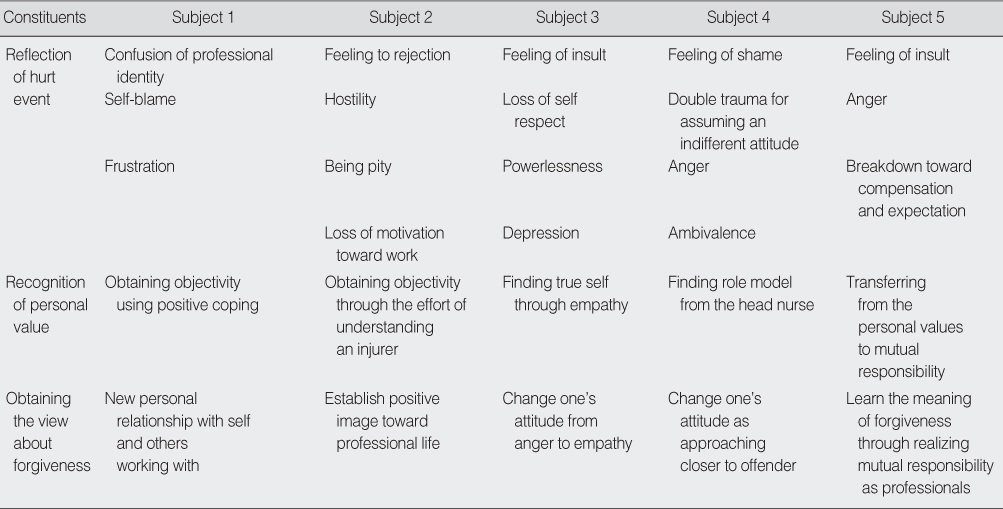Articles
- Page Path
- HOME > J Korean Acad Nurs > Volume 38(4); 2008 > Article
-
Original Article
- A Phenomenological Study on the Experience of Hurt and Forgiveness of Clinical Nurses in Korea after Loss of Employment
- Kae-Hwa Jo, Ki-Wol Sung, Yeong-Kyeong Kim
-
Journal of Korean Academy of Nursing 2008;38(4):561-572.
DOI: https://doi.org/10.4040/jkan.2008.38.4.561
Published online: August 31, 2008
1Associate Professor, Department of Nursing, Catholic University of Daegu, Daegu, Korea.
2Professor, School of Nursing, Catholic University of Pusan, Busan, Korea.
- Address reprint requests to: Jo, Kae Hwa. Department of Nursing, Catholic University of Daegu, 3056-6 Daemyung 4-dong, Nam-gu, Daegu 705-718, Korea. Tel: 82-53-650-4825, Fax: 82-53-621-4106, jokw@cu.ac.kr
• Received: May 6, 2008 • Accepted: July 22, 2008
Copyright © 2008 Korean Society of Nursing Science
Abstract
-
Purpose
- The purpose of this study was to understand and analyze the experience of hurt and forgiveness of clinical nurses in Korea.
-
Methods
- A phenomenological research method guided data collection and analysis. The subjects were a total of 5 nurses who had experienced hurt and forgiveness. Data was collected through individual in-depth interviews. All interviews were audio taped and transcribed verbatim. Coding was used to establish different concepts and categories.
-
Results
- The following three common constituents have been found as a retrospective focus based on the primary hurt related to the clinical situation; recognizing their personal values, obtaining their view about forgiveness, as well as their view of self.
-
Conclusion
- The results of this study may contribute to health professionals working in various clinical settings to understand Korean nurses with hurt and forgiveness experiences.
This work was supported by the Korea Research Foundation Grant funded by the Korean Goverment (MOEHRD) (KRF-2007-314-E00210).
- 1. Coyle CT, Enright RD. Forgiveness intervention with postabortion men. Journal of Consulting and Clinical Psychology. 1997;65:1042–1046.ArticlePubMed
- 2. Enright RD, Fitzgibbons RO. Helping clients forgive: An empirical guide for restoring hope. 2000;Washington DC, WA, American Psychological Association.
- 3. Giorgi A. Qualitative research methodology. 2003;Seoul, Qualitative Research Center. Workshop on the Giorgi's phenomenological method.
- 4. Giorgi A. . Qualitative research methodology. 2004;Seoul, Qualitative Research Center. Advanced workshop on the descriptive phenomenological method.
- 5. Greenhalph T. What seems to be the trouble: Stories in illness and healthcare. 2006;Oxford, Radcliffe Publishing.
- 6. Kang MJ, Lee H. The effect of assertiveness training on communication related factors and personnel turnover rate among hospital nurses. Journal of Korean Academy of Nursing. 2006;36:681–690.ArticlePubMedPDF
- 7. Ko JW, Yom YH. The role of social support in the relationship between job stress and job satisfaction/organizational commitment among hospital nurses. Journal of Korean Academy of Nursing. 2003;33:265–274.ArticlePubMedPDF
- 8. Lee EH, Chang SJ, Kim HO, Roh JH, Park EJ, Won JU. Relationship between job stress and turnover of registered nurses in a university hospital. Korean Journal of Occupational and Environmental Medicine. 2007;19:93–104.ArticlePDF
- 9. Lee KS. Forgiveness: Phenomenological approach. Journal of Korean Academy of Psychiatric and Mental Health Nursing. 2002;11:388–397.ArticlePDF
- 10. Lee SM. The effect of job characteristics and personal factors on work stress, job satisfaction and turnover intention. Journal of Korean Academy of Nursing. 1995;25:790–806.ArticlePDF
- 11. McCullough ME. Forgiveness as human strength: Theory measurement and links to well-being. Journal of Social and Clinical Psychology. 2000;19:43–55.Article
- 12. Oh MJ. A study on the experience of turnover among hospital nurses. Journal of Korean Academy of Fundamentals of Nursing. 1997;4:193–216.
- 13. Oh YH. The development of forgiveness in the context of friendship conflict. Journal of Educational Psychology. 1990;4:247–273.
- 14. Oh YH. The use of forgiveness in the treatment of Hahn: A psychological approach. The Korean Journal of Counseling and Psychotherapy. 1995;7:70–94.
- 15. Park JH. Exploration of the relation between forgiveness and health. The Korean Journal of Health Psychology. 2003;8:301–321.
- 16. Tae YS, Youn SJ. Effects of forgiveness nursing intervention program on hope and quality of life in woman cancer patients. Journal of Cancer Nursing. 2006;6:111–120.
- 17. Youn SJ. The effects of forgiveness nursing intervention program on forgiveness and mental health in patients with advanced women cancer. 2005;Busan, Kosin University. Unpublished doctoral dissertation.
REFERENCES
Figure & Data
REFERENCES
Citations
Citations to this article as recorded by 

- ICU nurses’ experiences of feeling hurt by medical personnel
Jung-Hoon Lee, Yeoungsuk Song
The Journal of Korean Academic Society of Nursing Education.2021; 27(4): 347. CrossRef - The Relationship among Anger-in, Forgiveness, and Quality of Life in Clinical Nurses
Jeong Hwa Choi, Young Sook Tae, Je Eun Heo, Young Suk Kim
Journal of East-West Nursing Research.2016; 22(1): 78. CrossRef - Effect of Workplace Bullying and Job Stress on Turnover Intention in Hospital Nurses
Younju Lee, Mihyoung Lee, Kunsook Bernstein
Journal of Korean Academy of Psychiatric and Mental Health Nursing.2013; 22(2): 77. CrossRef - A Q Methodological Study on Korean Nurses' Attitudes Toward Forgiveness
Kae-Hwa Jo, Gyeong-Ju An
Holistic Nursing Practice.2013; 27(1): 23. CrossRef - Perceived Hurts and Forgiveness in Clinical Nurses - The Status and Influencing Variables -
Ki-Wol Sung, Kae-Hwa Jo
Journal of Korean Academy of Nursing Administration.2010; 16(4): 428. CrossRef
A Phenomenological Study on the Experience of Hurt and Forgiveness of Clinical Nurses in Korea after Loss of Employment
A Phenomenological Study on the Experience of Hurt and Forgiveness of Clinical Nurses in Korea after Loss of Employment
Common Constituents of the Hurt and Forgiveness Experience and Empirical Variation for Subjects with Turnover Ideation
Table 1
Common Constituents of the Hurt and Forgiveness Experience and Empirical Variation for Subjects with Turnover Ideation
 KSNS
KSNS
 E-SUBMISSION
E-SUBMISSION

 Cite
Cite

